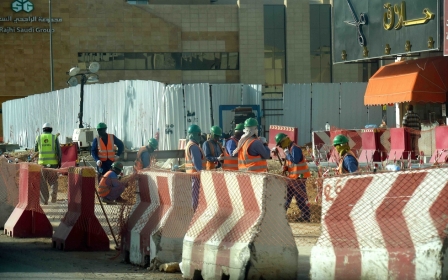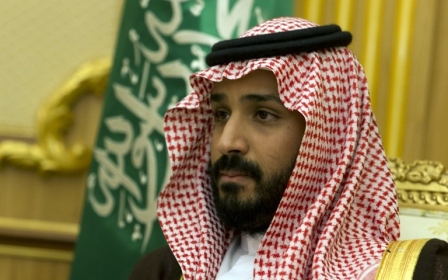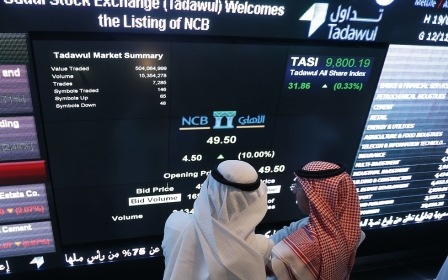Binladin Group caught in Saudi prince's austerity revolution

For more than six decades the Saudi construction giant the Binladin Group flourished as the builder of choice for the ruling Al-Sauds. Founded in the 1930s by the father of Osama bin Laden, the company was the beneficiary of huge projects, transforming communities like Mecca and Medina into high-rise cities that service the millions of pilgrims who come annually from all over the world to two of Islam’s holiest sites.
The Bin Ladens’ rapport with the Al-Sauds remained untroubled even after the events of 9/11, Osama bin Laden having already been removed as a shareholder from the company and disowned by the family in 1993.
The first sign of real trouble began with the collapse of a crane onto the Grand Mosque in Mecca in September 2015. More than 100 people were killed and nearly 400 injured. Though high winds were the primary cause, the Binladin Group was held largely responsible for the collapse. Senior executives were banned from travelling outside the country and more damaging still, the company was banned from any new projects.
But the real hammer blow was delivered by Mohammed bin Salman, arguably the most powerful man in the kingdom. He is, after all, the deputy crown prince, chair of the hugely influential Council for Economic and Development Affairs, defence minister and favoured son of King Salman.
The young prince is well known for his zealous attention to detail. The forensic examination he ordered of the accounts of various ministries turned up a startling fact: more than $1 trillion had been committed to projects, many without any contractual agreements. His solution was emphatic and draconian. As he told Bloomberg in an interview he gave in early April, “we froze (the projects) in 2015 and abolished three quarters of them that had no contractual agreements.”
Many of those deals were done when the price of oil was high and largesse for grandiose projects, and corrupt payoffs, was easy to come by. However, with the oil price driven down relentlessly by the Saudis themselves in a bid to protect market share, money for the government to spend has inexorably tightened. And it was the construction industry that caught the headwinds of austerity first.
The Binladin Group, the largest construction company in the kingdom, went in a matter of months from a position of unparalleled privilege to being very much out in the cold. The first to feel the chill, however, were the tens of thousands of poorly paid migrant workers that the company has exploited to build its vast fortune.
Rather than accept its responsibility to employees, the Binladin Group simply chose not to give them their wages. That led to something rare in Saudi Arabia: worker protests outside the firm’s offices. Then abruptly, at the end of April, the firm reportedly sacked between 50,000 and 77,000 workers and gave them permanent exit visas. The message was clear: we are not going to pay you so out you go and by the way you are not coming back. But the workers say they will not leave until they are paid. Underlining their determination, a day after the sackings several company buses were torched in Mecca.
How this will all end is anybody’s guess but the Saudi labour minister, weighing up reputational damage to the kingdom, has vowed that Binladin Group employees will be paid. Still, there is not a great deal of sympathy for the plight of foreign workers, least of all from Mohammed bin Salman.
He has already said: “I have reserves now, ten million jobs that are being occupied by non-Saudi employees that I can resort to at any time of my choosing.”
The economic revolution that he has just unleashed, called Vision 2030, has no place for expat workers. He wants to get rid of them. And his lack of sympathy extends to the companies that employ them.
Speaking about another once highly favoured but now troubled construction firm, Saudi Oger, Mohammed bin Salman had this to say: “Saudi Oger can’t cover their own labour costs. That’s not our problem, that’s Saudi Oger’s.”
The same ruthless logic applies to the Binladin Group. And in a country with no labour unions and an appalling record of migrant worker exploitation that has gone unchallenged for decades, the deputy crown prince can pretty much do what he wants. He can have those 10 million jobs, but the larger question is will Saudis, long accustomed to a comfortable life style, be ready, willing and able to fill them?
Without that, Mohammed bin Salman’s economic revolution will flounder. But I doubt that there is anyone in the House of Saud bold enough to whisper in his ear “beware of what you wish for”.
- Bill Law is a Middle East analyst and a specialist in Gulf affairs.
The views expressed in this article belong to the author and do not necessarily reflect the editorial policy of Middle East Eye.
Photo: Logo of the Saudi Binladin Group on their headquarters in Jeddah on 20 September 2001 (AFP).
Stay informed with MEE's newsletters
Sign up to get the latest alerts, insights and analysis, starting with Turkey Unpacked
Middle East Eye delivers independent and unrivalled coverage and analysis of the Middle East, North Africa and beyond. To learn more about republishing this content and the associated fees, please fill out this form. More about MEE can be found here.





